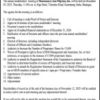Cebuana Lhuillier Foundation, Inc. (CLFI) on Thursday raised concerns over the lack of financial inclusion among Filipino youth, stemming from poor financial literacy.
“BSP’s (Bangko Sentral ng Pilipinas) record is showing that only 27% of the youth aged from 15 to 19 are financially included,” CLFI Executive Director Jonathan D. Batangan told reporters at the sidelines of an event.
“It should not be 27% only. In a matter of one or two years, we hope to increase the number of financially included youth,” he added.
Polytechnic University of the Philippines (PUP) President Manuel M. Muhi echoed the same concern, underscoring the “millions” of Filipino youth excluded from the formal financial system.
“Many still do not have access to basic financial services such as savings accounts, insurance, or digital payment platforms,” he said in his speech. “Without financial access, opportunities are delayed, dreams are deferred, and progress becomes uneven.”
“We believe that financial literacy and access are just as transformative as a diploma,” he added.
In 2024, CLFI first launched the financial literacy module for Grade 12 students at the University of Makati (UMak). The self-paced five modules, which take about five days to finish, cover topics such as personal finance, microinsurance, microinvestment, microloans, cash transfers, and green and digital finance.
“It’s a self-paced, downloadable program which is actually at the own pace of the students and they can, at the end of the day, get a certification,” Mr. Batangan said.
“They will have a certificate for being financially literate. It adds to the prestigious reputation of the graduating student,” he added.
In partnership with PUP and the Philippine Association of State Universities and Colleges (PASUC), the CLFI aims to expand its financial literacy program to SUC students to help produce approximately two million financially literate graduates.
“We hope the members of the Philippine Association of State Colleges and Universities, of course, PUP being also a member, can be able to trickle this down to almost 120 SUCs (state universities and colleges),” Mr. Batangan said.
“We’re starting with SUCs (state universities and colleges) because these are the students who came from the marginalized sector; they’re the ones we need to teach financial literacy,” he added.
A 2024 report by consumer insights company Inquiro found that the Philippines’ financial literacy rates remain low, with about 25% of Filipinos understanding basic financial concepts.
The report added that although the country’s literacy has increased by around 5% since 2020, it still lags behind other Southeast Asian countries, such as Malaysia and Singapore, where literacy rates exceed 50%.— Almira Louise S. Martinez


















